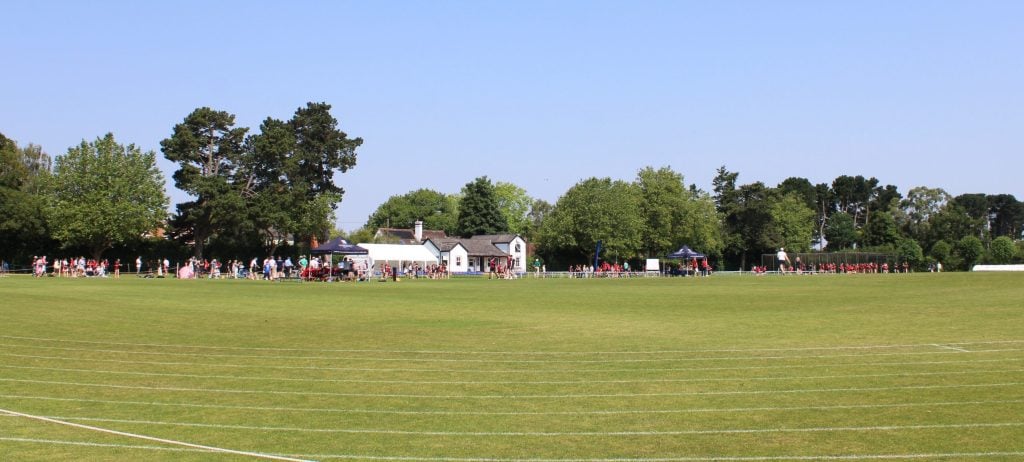Category: Sixth Form News
We’re delighted to be able to share this year’s A level results from our Class of 2024 students.
- This year we are celebrating a record number of Woodbridge School students achieving straight A*– A grades
- 86% A*- A grades achieved from Art, Music and Drama
- 92% A*- A grades from Latin, Classical Civilisation and Classical Greek
- Grade A was our most common grade
- More than 65% of students achieved UCAS points equivalent to AAB or better – our best yet
The breakdown below represents A level grades achieved at Woodbridge School this year, in terms of percentages:
- A* 16%
- A* – A 44%
- A* – B 66%
- A* – E 98%
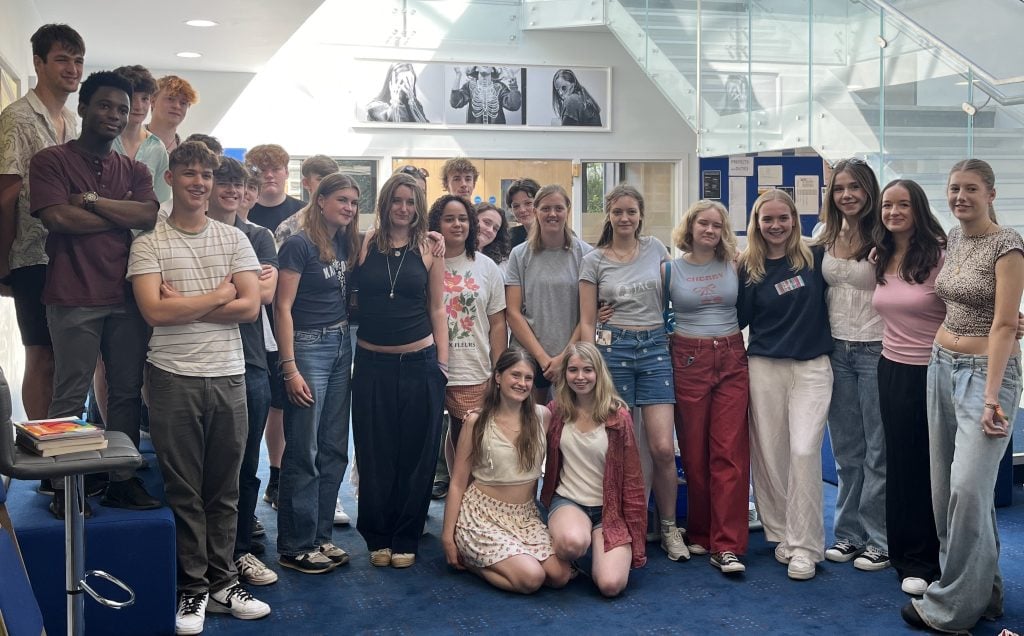
“On behalf of everyone at Woodbridge School, I would like to take this opportunity to congratulate our students upon their excellent A level results; their achievements are testament to the hard work and dedication shown throughout their time with us at School. I would also like to thank our superb staff for their commitment and diligence.”
Shona Norman, Head
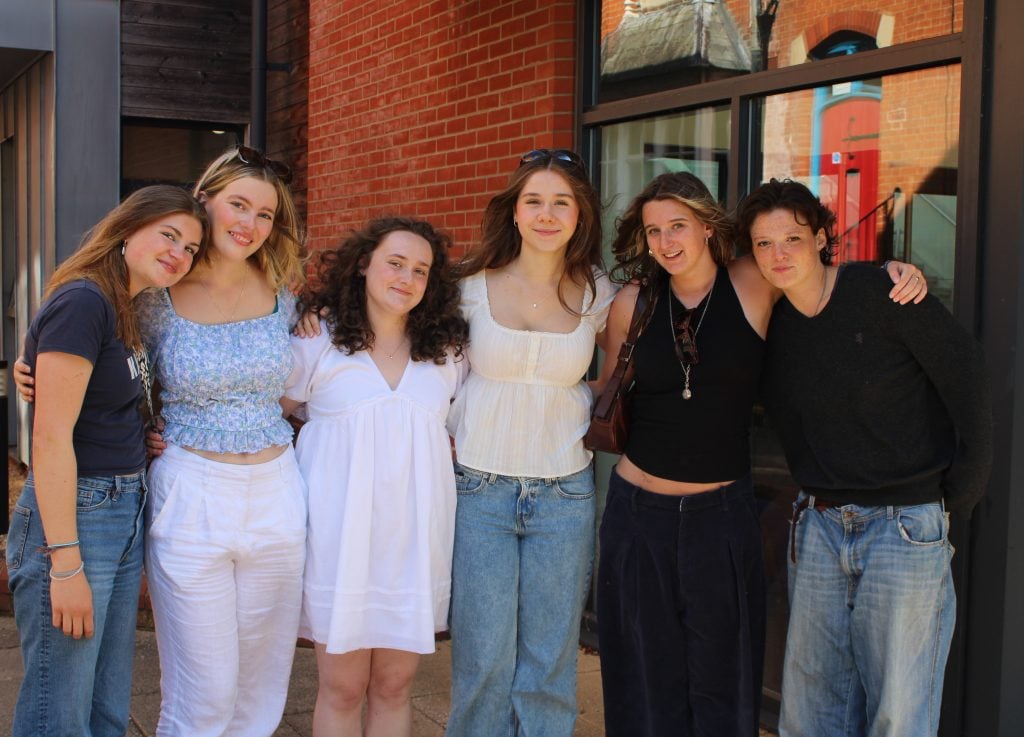
“I am delighted by our students’ commitment to their studies, with a record number getting straight A grades or better. Woodbridge students truly follow their passions, and we are very proud of their excellent results in arts subjects and the classics, as well as over 70% who study either English literature or one of the so-called ‘hard sciences’. As our impressive range of university destinations shows, our students leave here ready to pursue their dreams in a variety of fields, living the Woodbridge School values as they go.”
Karl Hayward-Bradley, Deputy Head Academic
Students recently took part in the National Schools Target Rifle Competition at Bisley, spending four days enjoying a programme of activities and events, their accommodation and meals provided at Brunswick Camp, Pirbright in Woking.
Showcasing target rifle at its very best, the competition comprised of a range of shooting opportunities for cadets. Year 12’s Oscar shares his experience:
Oscar, Year 12
Our shooting team, including Year 12’s Oliver, Jack and I as well as Year 10’s Ernest and Arlo and Year 9’s Woody, all set off in the Woodbridge School mini bus on Sunday morning heading for Alexander Barracks, Pirbright. On arrival we set up and went for dinner ready for our first practice day. Over the Monday, Tuesday and Wednesday we all had the chance to practice shoots consisting of two sighters and seven scoring shots with a maximum score possible of 35.7. We started off shooting twice at 300yds and then moved back to shoot twice again at 500 yards and ending the days with one 600 yard shoot.
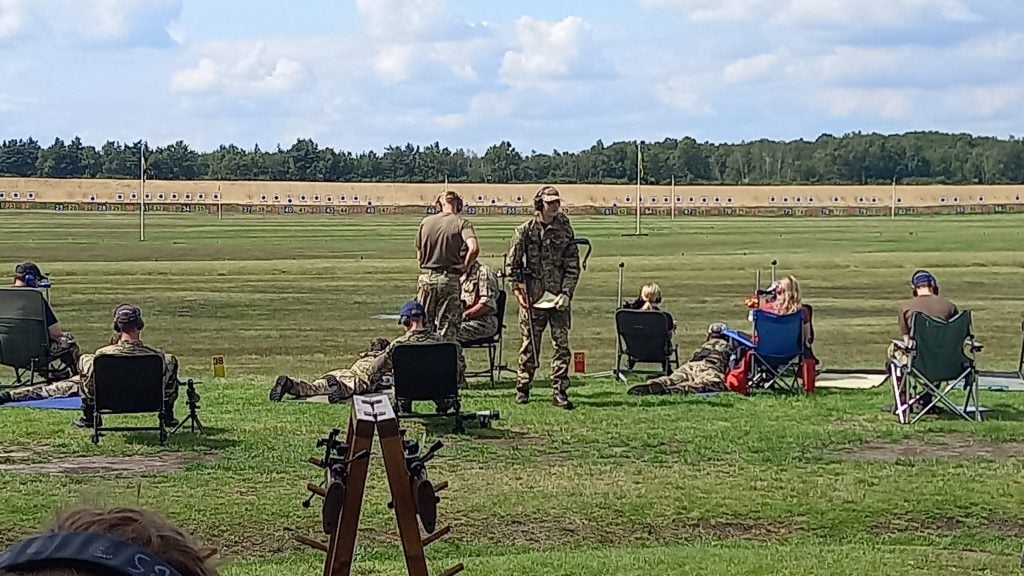
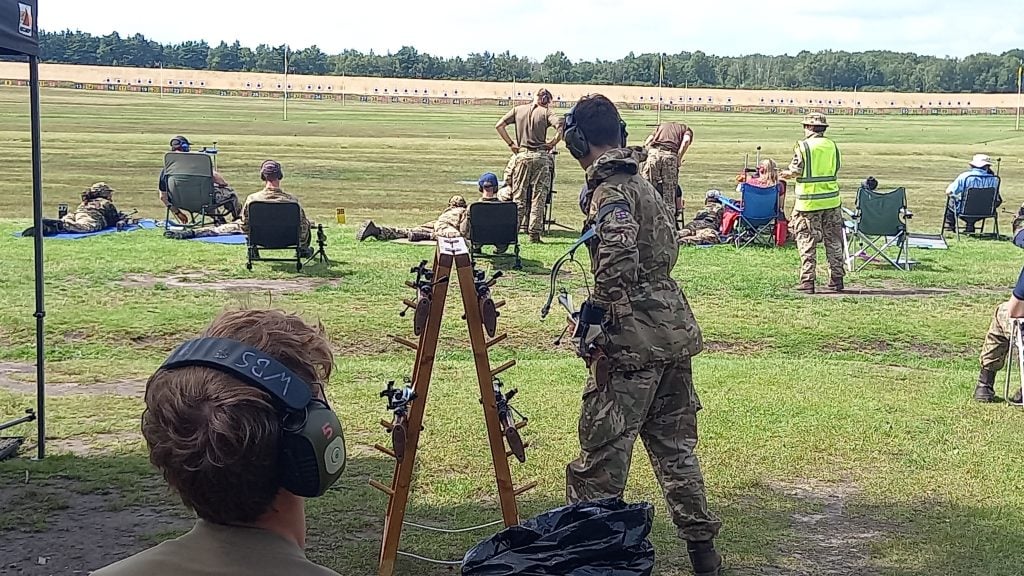
The food was good and on Wednesday evening we had the chance to do a clay pigeon shoot after dinner which everyone really enjoyed.
On the Thursday it was Ashburton Day which was the main competition. The opening of the competition was marked by a detail of the Scottish cadets who marched down the 300 yard firing point to the magnificent sound of the bagpipes. We then started with the team of four in the School Fours (WO1 Oscar, Sgt Oliver, L.cpl Arlo and Cadet Woody) followed by the team of two (Sgt Jack and Cadet Ernest) in the School Pairs. We did all the ranges and then the final competition was the Spencer Mellish in which the best shooter from each school takes part in a competition where you shoot two sighters followed by 10 scoring rounds. You do not have a coach and have to rely on yourself to make adjustments to the sights. It was an honour to be picked to shoot in this part of the competition and I really enjoyed the challenge and learnt a lot, especially about how to counteract the wind!


Thank you to all of the cadets that took part, representing themselves and the School brilliantly, and to Austin for teaching me how to coach and for teaching all the new cadets how a full bore shoot works. A special thank you goes to Mr Stollery who made it all happen.
Offering support and guidance as well as setting an example to every student in School, our Heads of School and Heads of Boarding are an important part of our community and a vital part of the relationship between the School and the students.
Appointed in the Trinity Term, ahead of beginning their role officially in the new academic year, they are appointed by their peers and teachers, their selection demonstrating their ability to deliver the many aspects of their roles, and the faith their School community has in them. The welfare of each and every students is paramount, and these Year 13 students form part of a very wide umbrella of care and support and are people who are particularly perceptive in spotting difficulties as they begin to arise. From minor academic worries, to issues with confidence or image, as well as major life events that are affecting how they feel and behave, Heads of School and of Boarding provide support, reassurance and encouragement.
Here they all share their experiences, challenges and thoughts about their roles, responsibilities and experiences of life at Woodbridge School.
Heads of Boarding – James and Polina

Alongside the difficulties and situations day students may encounter, we recognise that our boarders are spending an extended period of time away from their home, family and friends. The appointment of Heads of Boarding is a reflection of this acknowledgement, and as fellow boarders themselves they can relate and share coping mechanisms, support available and strategies to overcome with their fellow house mates. Being a boarder at Woodbridge School is very much like being part of an extended family; students experience all the support and care that this implies.
James, Head of Boarding 23/24
Year 13’s James is Head of Boarding and a UK boarder who has been at School House since 2021. Studying DT, Maths and Physics A levels, having taken Maths, Chemistry, Biology, Physics, English Literature, English Language, Latin, Spanish, Art and History GCSEs, James plans to take a gap year after his A levels; exploring the Southern Hemisphere before continuing to study Architecture at University in 2025.
James shared his thoughts on life as a boarder at Woodbridge School.
“I’ve loved boarding at Woodbridge School, for so many reasons. I’ll be sad to leave the School and the boarding house, mainly because boarding has provided me with many opportunities and benefits. From living among other students, older and younger – all of which helped me at different times in different ways, to helping me to settle in when I first arrived, supporting me throughout and helping me in so many ways while taking my GCSEs and A levels.
When I first arrived, I had two German roommates, neither of whom had ever seen a rugby ball before, let alone played the game. We were all excited to learn to play, and every day during the Spring and Summer months, we’d head out to the rugby pitches together and practice for a few hours, we all learned new skills – and we had great fun! I often think how lucky I am to have had that experience, and I’m fully aware that I probably wouldn’t have had it had I not been a boarder – it’s one of my fondest memories.
My favourite part has been the independence I’ve developed. As you progress through the School years, you are given different privileges and freedom, by the time you reach Sixth Form a system of trust is in place, you’re treated like a young adult living in a home.
Mr and Mrs Pineo, who manage the boarding house and live there too, regularly give up their time to help and care for everyone in the house. Although I only lived a short distance away before I started boarding, I’ve been given far more freedom and opportunities to explore my interests than I ever thought or imagined.
As there would be at home, there are challenges living at School and many issues I feel I would have faced and felt living at home with my own family. When staying away from home for extended periods it’s inevitable that you’ll encounter homesickness. But the house works so well; its supportive environment means I felt comfortable talking to someone, a teacher or a friend, about how I was feeling, and they helped and supported me through those feelings – just like a family would. It’s those people that I’ll miss the most when I leave, not just the students but the teachers, they’ve all been so important to me.
Boarding is a great opportunity to develop your confidence and build lasting friendships with people from all across the world. I fully intend to have a reunion with my German roommates from Year 11 and to go together to Oktoberfest! I know we’ll be as close as we used to be and I can’t wait to see them.
If you’re considering boarding at Woodbridge School, I would say definitely give it a try! You might feel nervous and anxious about leaving your home and coming to stay in School, but you needn’t be. I worried about fitting in, it’s completely natural, but after a trial week I loved it and officially joined the house; everyone was supportive and welcoming, they understood exactly how I felt as they’d all been in the same situations – everyone is there for each other. Boarding has been a decision I’ve never regretted.”
Polina, Head of Boarding 23/24
Talking to Year 13’s Polina, one of our Heads of Boarding at Woodbridge School, ahead of her A level exams in Economics, Maths and Sociology, it’s clear that friendships and relationships made while boarding will stay with her forever. Having studied Maths, English Literature, English Language, Combined Science, Drama, Design, Business and Computer Science at GCSE, Polina, who is from Ukraine, plans to go to King’s College London to study Economics.
“For the past four years I’ve boarded at Woodbridge School – and I’ve enjoyed every moment! The boarding house is just like a family house, everyone takes care of one another, looks out for each other and supports one another through everyday life. I think the memories made will be with me for the rest of my life, as will the friendships.
I think if you talk to anyone who stays here, the one thing that stands out for them the most is the amazing food! I’ve never felt hungry, there’s always so much choice, we eat together like a family, there’s a range of choices at every meal – it’s absolutely brilliant.
As you can probably imagine, there are students from different backgrounds and cultures in the boarding house, which can be interesting and challenging in the best possible way. Learning to appreciate one another’s beliefs, interests and culture is an invaluable part of the experience of boarding, and one which I feel will most definitely benefit us all throughout our lives. These skills, the consideration and the respect we feel and show for one another is an important part of boarding life.
This is echoed through the support that the staff and students provide for one another; it’s inevitable that there will be ups and downs in everyday life, but no matter what the problem might be, the concern or worry you might have, everyone does their absolute best to do all they can to help at any time. You’re never alone – unless you want to be and there’s plenty of privacy too – but someone is always there if you need them.
Trips at weekends and in the holidays are some of my favourite memories of being a boarder; when the whole house comes together we always have an amazing time – it’s always so much fun. Not only do you get to experience different activities, see different parts of the area and country, you make friends with everyone in the house, learn more about them and yourself through these experiences, they’re an integral part of School life for me – and everyone else.
I’ll miss everyone when I leave Woodbridge School, but especially my fellow boarders, past and present, I’ve always stayed in touch with everyone that I’ve met and I know that will never change.”
Heads of School – Isla and Ollie
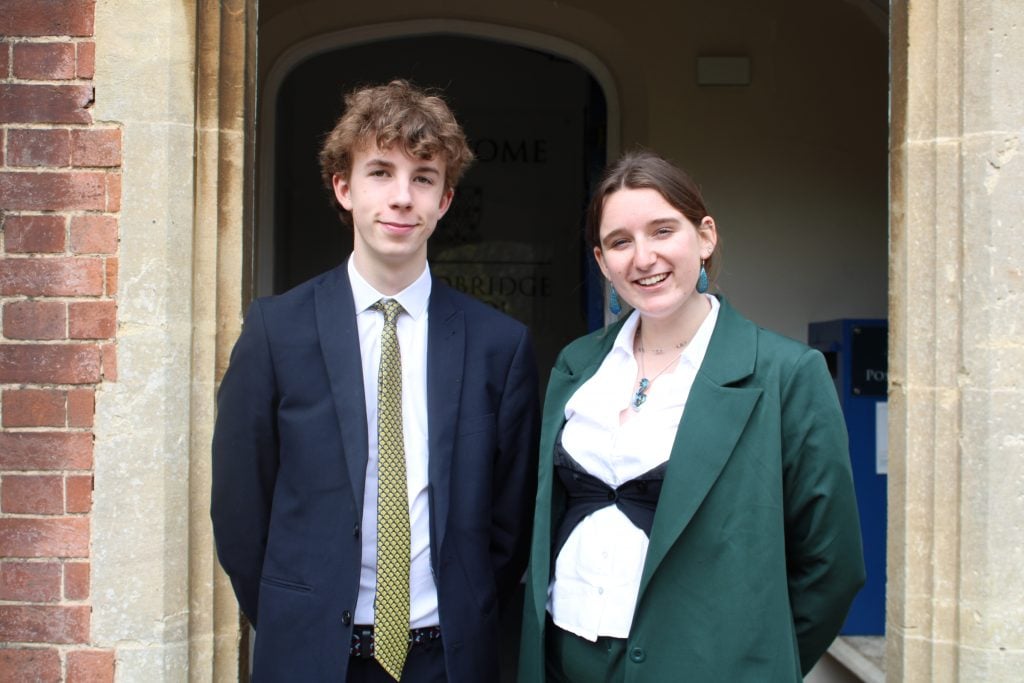
Isla, Head Girl 23/24
Our Heads of School for the academic year 23/24, Isla and Ollie, have spent their entire primary and senior School education together, having joined in Reception at Woodbridge School Prep over 14 years ago. They both reflect on their appointment and share their speeches which they were both invited to make at our end of School year Speech Day.
“When I became Head Girl, more than anything I wanted to leave a positive impression and mark upon the School and our students, doing my very best to enact positive changes and trying new things. Becoming Head of School was an opportunity to give something back to a community which I myself have gained so much from.
As a young person in School I remember the importance and impact of the role models I saw every day; looking up to students as well as teachers, they motivated and encouraged me significantly, particularly during my early years in Senior School. As Head Girl I’ve encouraged students from every year to approach me/us and worked hard to make them feel they are listened while providing support.
So many of my interests and the things that define me as a person have stemmed from the encouragement I’ve received, and my biggest hope was to create that confidence in others, to assist with them fulfilling their potential throughout School and beyond.”
Speech Day 2024, Isla, Head Girl 23/24
“Like Oliver, I have been at Woodbridge for over 14 years.
This is the last formal action I will ever undertake as a student, and I hope you’ll forgive me that I’ve gone rather personal.
I, like many people, am a chronic overthinker. At times, this has affected my ability to work, to sleep, and my relationships with my friends.
But this is a School that understands that in every weakness there is a strength. An understanding that moves beyond the cheap soundbite and underpins the respect and empathy that every member of our community has for one another.
For me, what at face value was a weakness, lent itself well to my subjects. I am one of those frustrating people who overanalyses a sentence until it seems like a deep metaphysical examination of human existence.
With the guidance of astute teaching, what seemed like a weakness was used to shape my love of subjects like English where overthinking is encouraged.
At Woodbridge, there is a strength in every weakness.
I have learnt not to put myself in a box – or at least not to close the lid.
The School doesn’t do labels. I like to think Ollie and I are walking examples of this.
At nursery I was told I should probably stay down a year as I preferred telling people what to do than making friends. Furthermore, even a few years ago the idea of speaking in front of so many people would have made me want to shrivel up. If I am honest not much has changed.
Meanwhile, until he reached mid-adolescence, Ollie was renowned for goblin like behaviour.
Ollie has already spoken of our mutual dislike in those early years. It wasn’t entirely unjustified – on both sides. Yet, now we have the deepest respect for each other.
Each of us is different. The School recognises it, encourages it, and celebrates it.
On behalf of every student here, I want to say a big thank you to the parents, grandparents, and guardians who make sacrifices to send their children to Woodbridge School. I hope that today is a reassurance of your profound investment of love, of time, and indeed of finance. Thank you, from us all.
Lastly, I have been lucky to have been party to many aspects of the School. Having teachers for parents and having been here for such a long time, it’s been such a huge part of my identity.
This is a School where the effort of every adult is so important. It’s crucial to recognise the immense contribution and care for students by the caterers, the cleaners, the groundsmen, the secretarial and admin staff. Thank you.
But, my friends have been my cornerstones of being at Woodbridge. I look at and listen to someone like our wonderful speaker Coco Newton. The faces that I see every day in the common room will, too, move on to do such diverse and inspirational things.
To my fellow leavers, there is a whole stretch of life in front of us. It is terrifying. I have no idea where we will all end up in one, two, or five decades. I hope that so many of the people I have met here will still be in my life.
To you in the younger years: cherish the people around you.
I said I wanted this to be personal. Music has for me been so central to my life here.
So, may I leave you with wise words from Billy Joel’s masterpiece, ‘Vienna’: “Slow down, you’re doing fine. You can’t be everything you wanna be before your time.”
Thank you very much.”
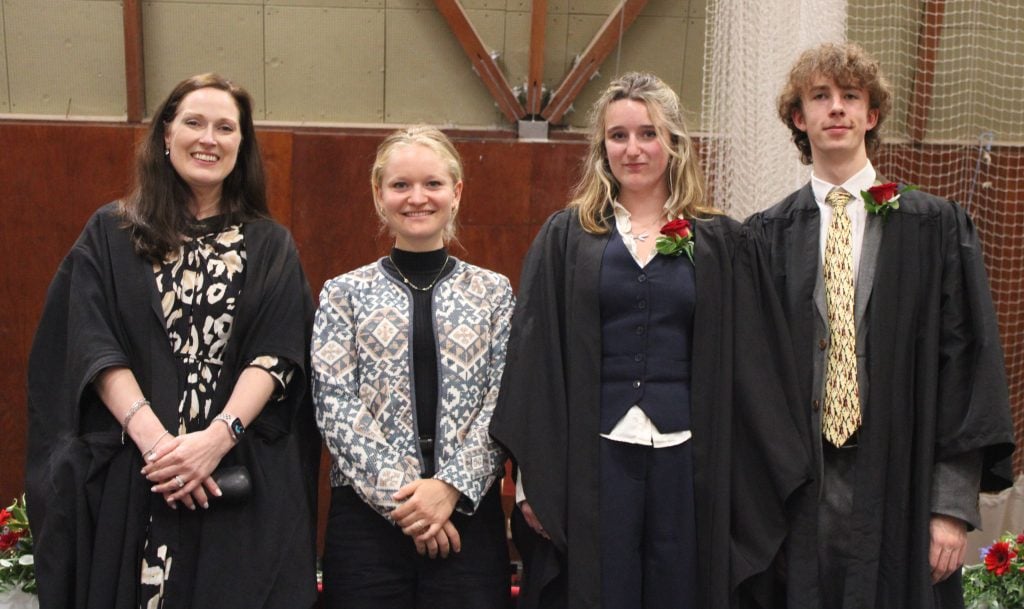
L-R – Shona Norman – Head, Woodbridge School, Dr. Coco Newton – Guest Speaker (OW), Isla – Head Girl, Ollie – Head Boy
17 members of our Army cadets from Years 9, 10 and 12, attended summer camp last week, staying at Longmoor Training Camp in Hampshire for a week.
The week was filled with a range of training exercises which began on the first day when the cadets deployed into the field for the fieldcraft package. Here they carried out platoon harbour drills, section attacks, wood clearance operations and a reconnaissance patrol.
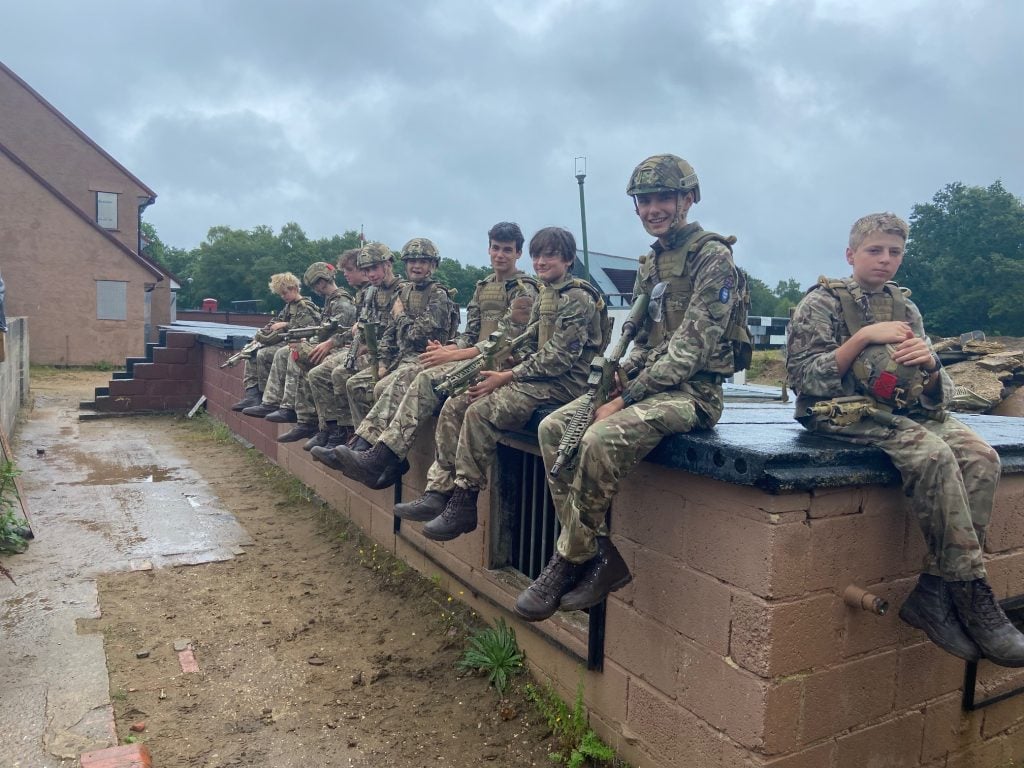
Next came the close quarter battle paintball package – this wasn’t the usual paintball game but a full day learning and then rehearsing all the drills required to conduct a night time building assault. The cadets used guns with laser pointers and torches attached, and all wore full body armour.
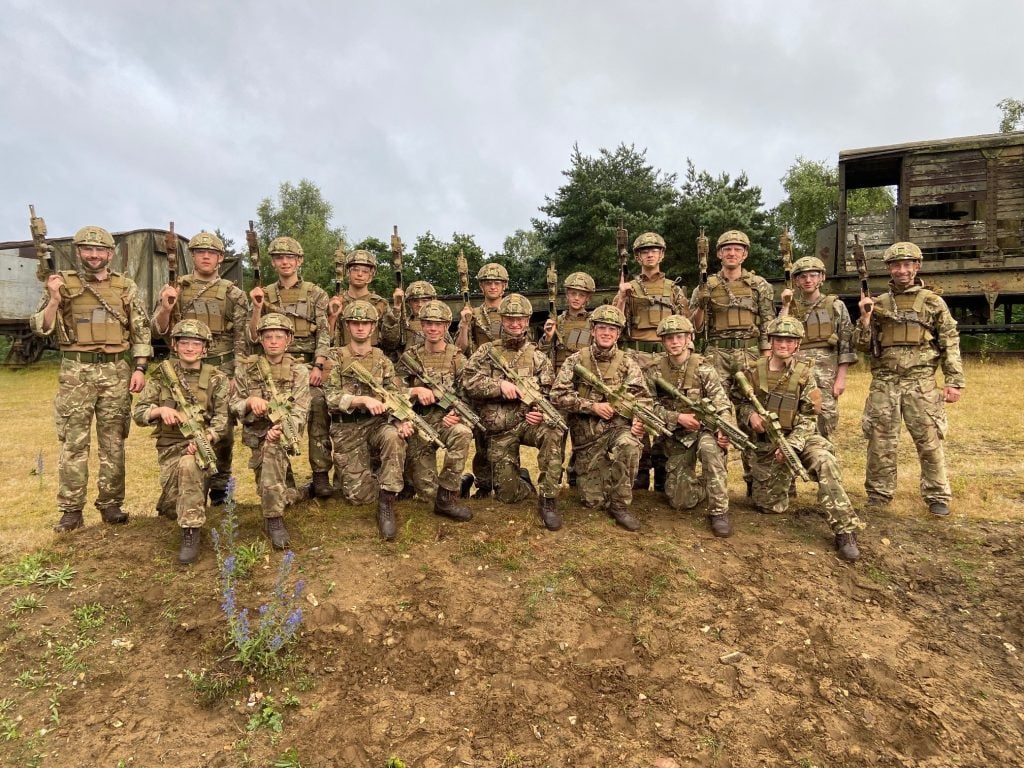
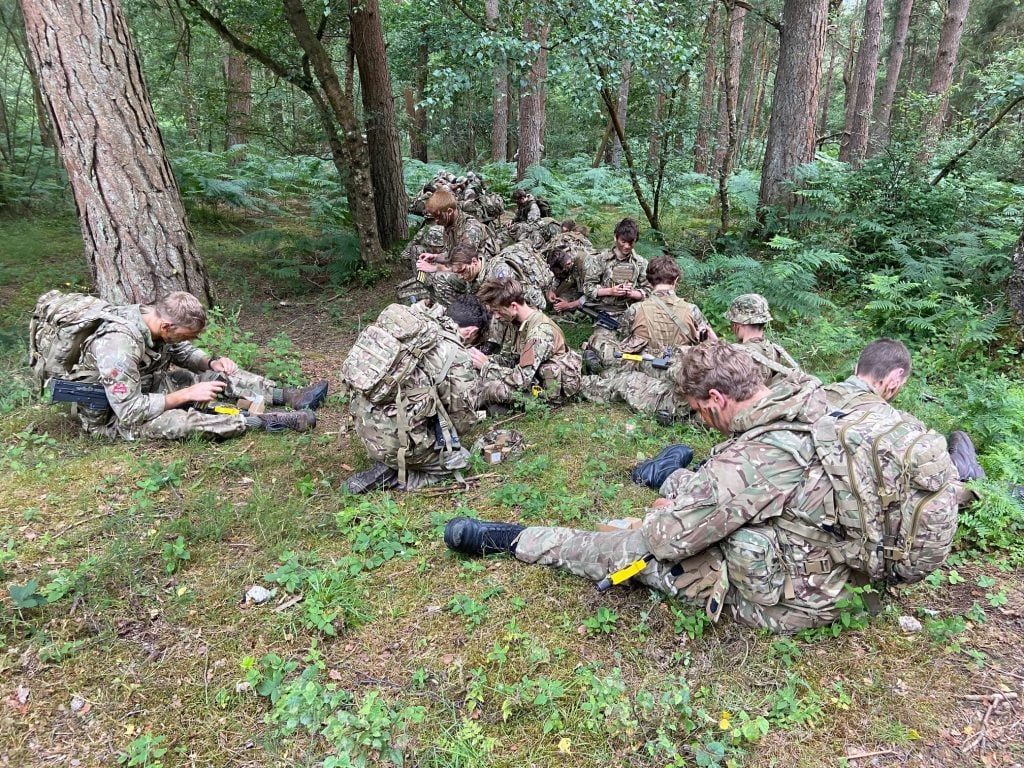
Wednesday saw cadets enjoy a range day, engaging targets at various ranges using the cadet rifle and live ammunition – and exciting and exhilarating day for everyone.
Cadets enjoyed a cultural visit to Portsmouth later in the week, visiting the D-Day museum and even had the opportunity to walk around a landing craft that was used on the day. They also visited HMS Warrior and Victory, and the Mary Rose. Although this wasn’t what you might consider a typical Army summer camp day, it was incredibly interesting and the students had a great time.
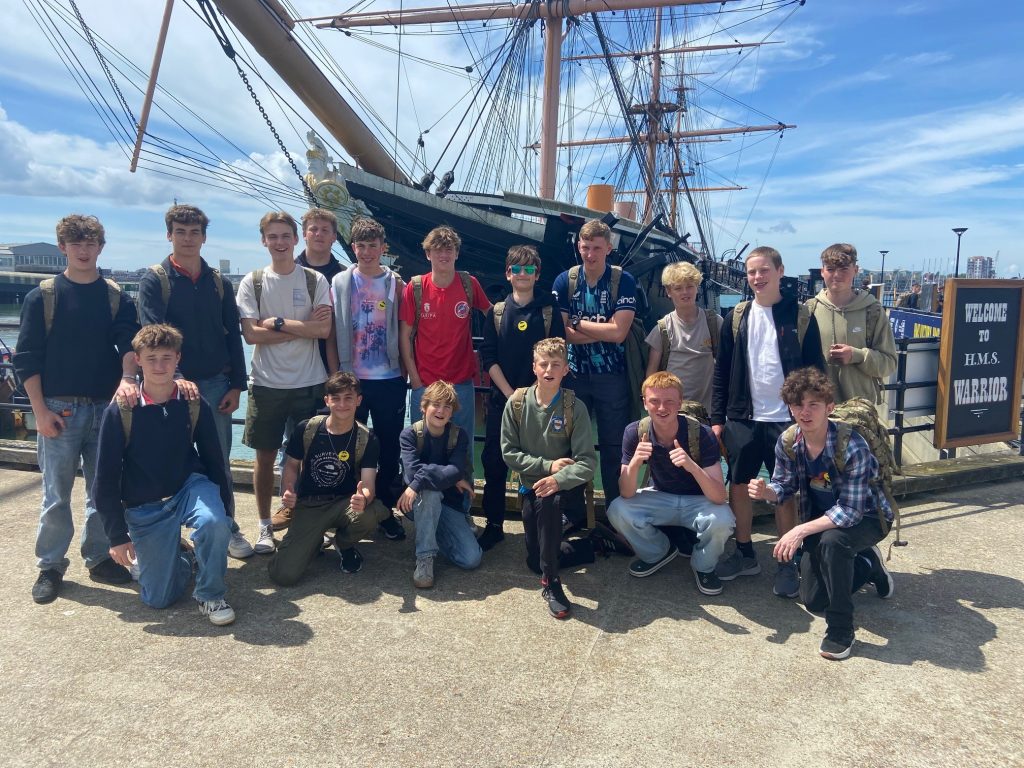
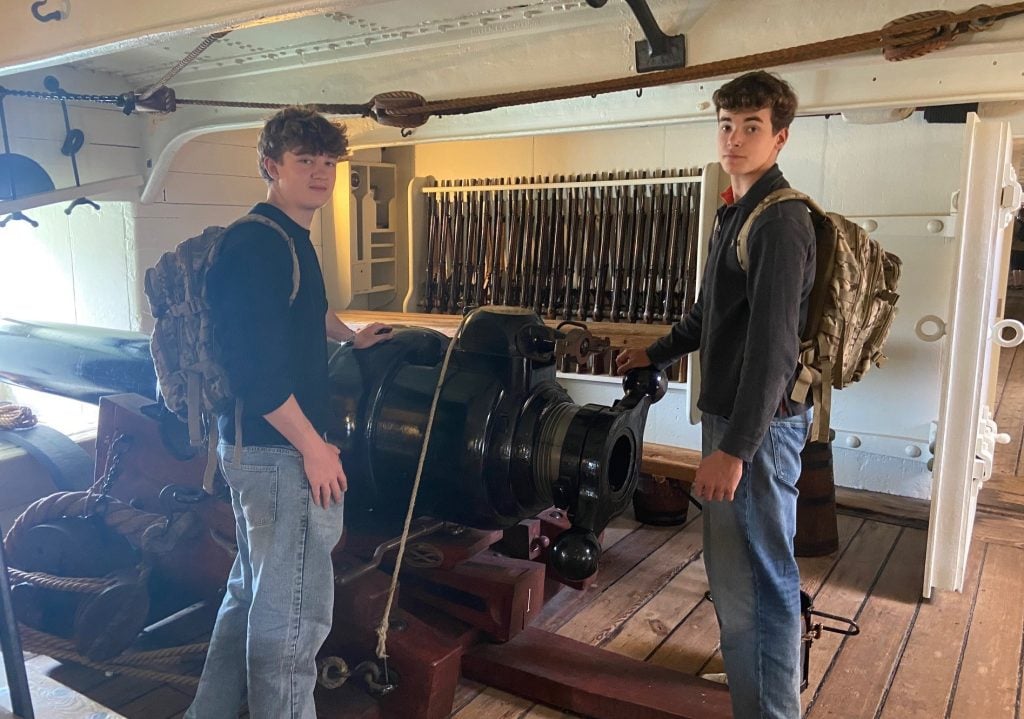
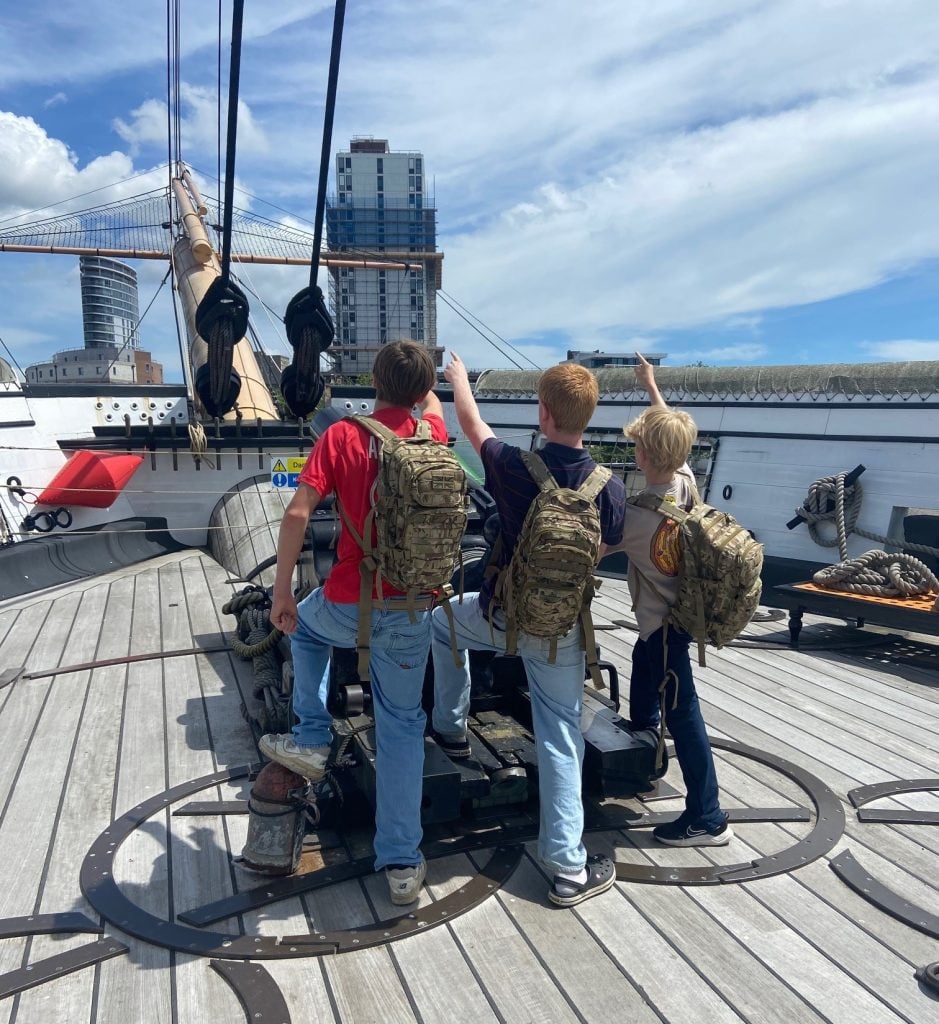
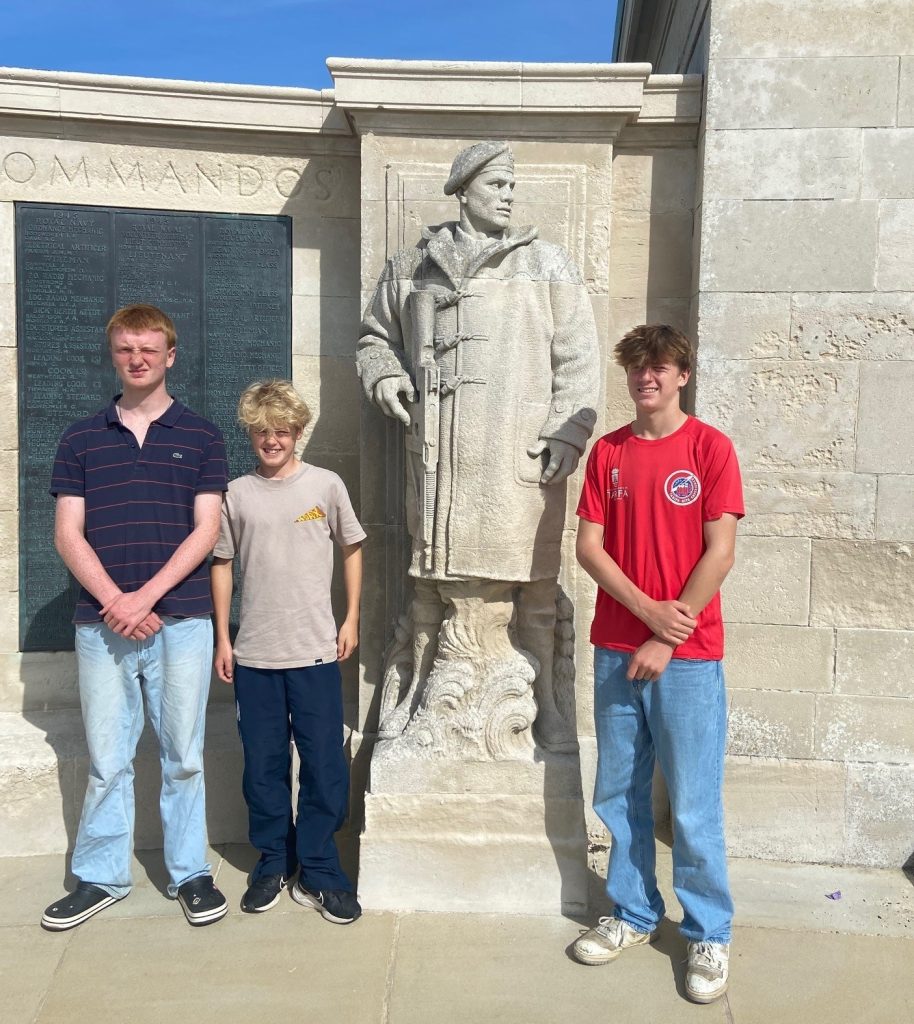
On the last day of the summer camp it was time for the fieldcraft exercise test day. The cadets took part in an ambush, platoon attack and wood clearance and fired over 300 rounds of blank ammunition.
It was a really great week for everyone, thanks go to everyone who made it possible including Mr Garvie and Mr Capjon.
The final Head’s Commendations of the academic year were awarded in School this week to two groups of students, each joining Miss Norman to celebrate with tea and cake.
On Tuesday Year 8’s Grace received hers for her recent win at Hickstead Equestrian Championships, while Year 11’s Juno, Rose and Georgia, along with Year 13’s Felix were awarded theirs for volunteering to help at Sports Day last week. Year 13’s Layo was also recognised for raising money for The Bridge School. Our Senior School students were joined by Year 6’s Chloe who celebrated being part of the team that qualified for the Prep School’s Athletics Championships.
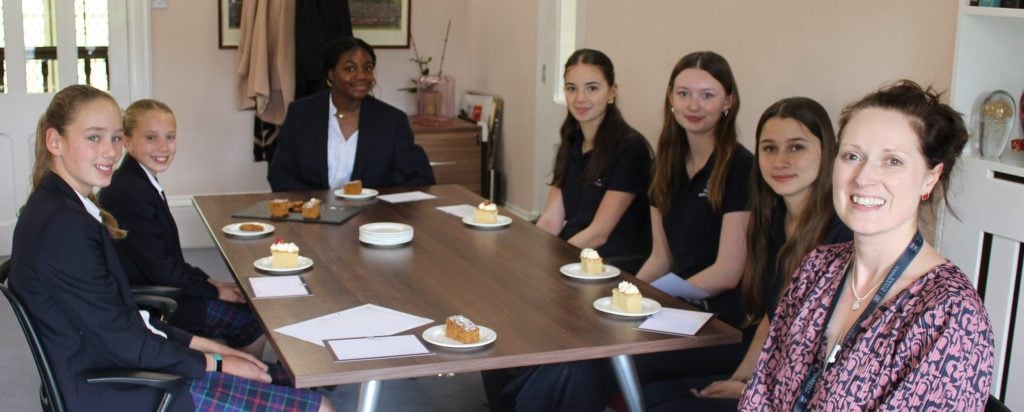
Thursday saw several students recognised by Miss Norman for also qualifying for the Prep School’s Athletics Championships, including, Year 7’s India J, Olly, Alexandra, Thomas, Josh and Dexter, as well as Year 8’s Digby and Oscar.
Digby was also commended for breaking the Year 8 300m, 800m and 1500m records at Sports Day – the 800m record had stood since 1977! Likewise, Alexandra broke the Year 7 800m record, Thomas the Year 7 300m record, Josh the year 7 200m and 1500m record and Dexter the Year 7 800m record!
Year 12’s Hugh also joined Miss Norman in recognition of going above and beyond at an agent visit recently.
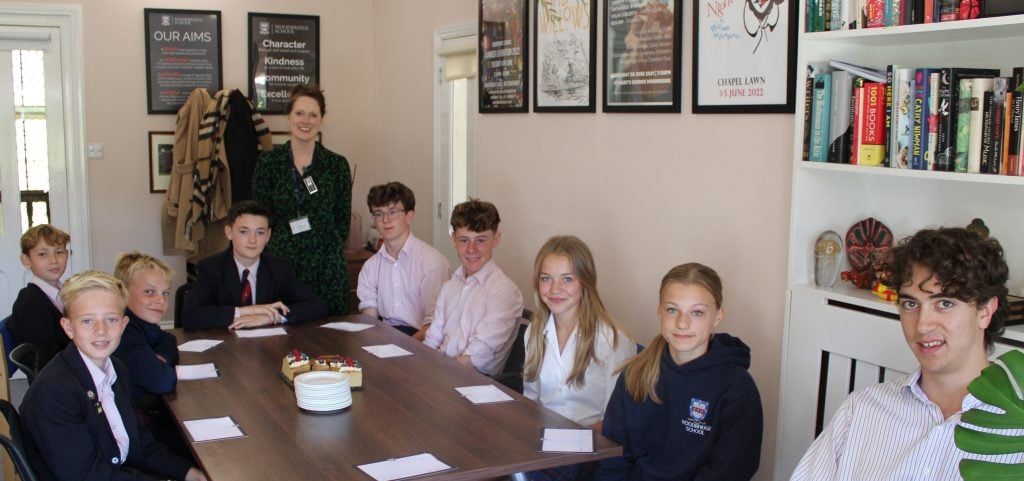
Throughout the year many students have been successful in being nominated and selected for to receive a commendation from Miss Norman for a huge variety of achievements and contributions to School. Well done to everyone, we look forward to celebrating more in the new academic year no doubt!
Following on from her earlier success in the Immerse Medical Essay Competition, we are delighted to announce that Year 12’s Charlotte has gained an Honourable Mention in the prestigious Cambridge Rethink Essay Competition.
Charlotte, who hopes to study Medicine, wrote a 2,000 word essay entitled ‘Should We Move Further Forward with IVG?’. In it, she assessed new techniques used with cells, including exploring the possibility that emerging developments might remove the need for blood and organ donors in the future.
The Rethink Essay competition is an international one, and thousands of competitors entered from across the globe. Charlotte’s essay had to get through four rigorous rounds of blind review by scholars from Cambridge, Oxford, Stanford, MIT and Ivy League universities, and she has done exceptionally well to gain an Honourable Mention.
The judges commented that her “outstanding essay and intellectual contribution have truly set her apart, and we are delighted to acknowledge her remarkable achievement”.
Very well done indeed, Charlotte.
Last Friday, our traditional Field Day took place, with students taking part in various activities including trips to Go Ape, Colchester Zoo and our CCF cadets at various locations enjoying different activities.
Year 7 and 8’s Visit to Go Ape and Colchester Zoo
Taking some out of their comfort zone, Go Ape offered Year 7 students the chance to climb the high wire courses and challenge themselves in all sorts of ways! Meanwhile Year 8 enjoyed learning more about endangered species as well as visiting all the other animals at Colchester Zoo. Everyone had a great day.
CCF RAF Field Day and Overnight
Our RAF cadets had a great time on their Field Day and overnight stay at Barnham training area. Enjoying a full-scale overnight complete with run-ins with real RAF regiment gunners, students took part in a real variety of activities during the day and evening. From stalking and patrolling, to air rifle shooting, everyone had a fantastic time, enjoying the experience and taking on board a host of new skills.
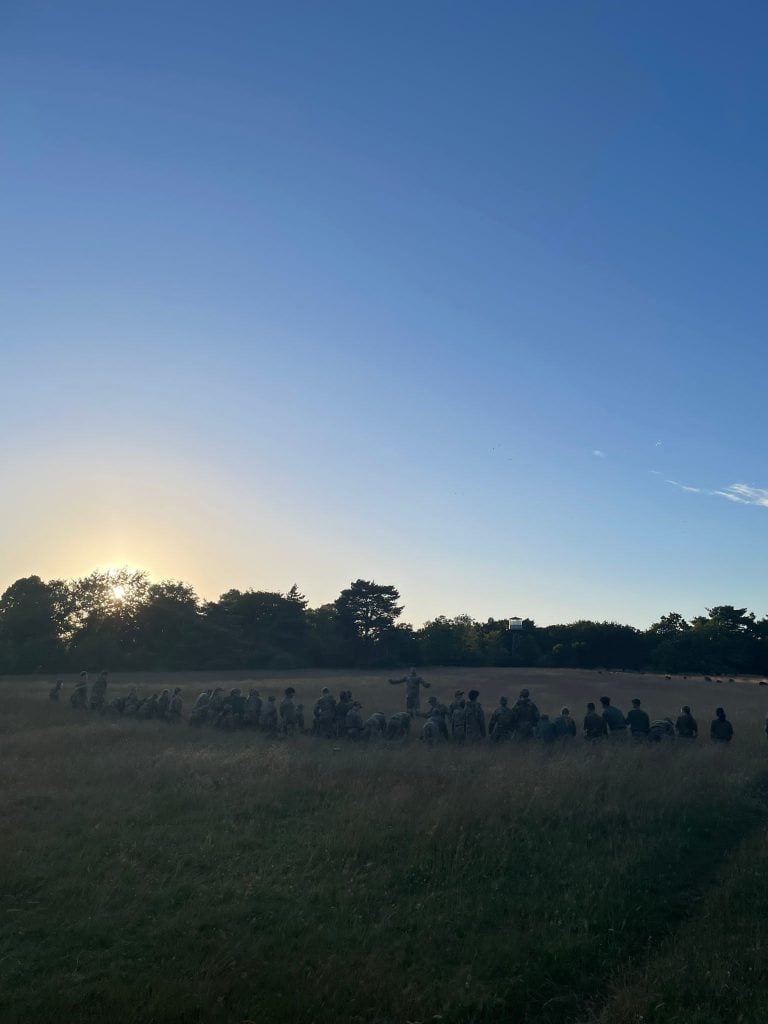
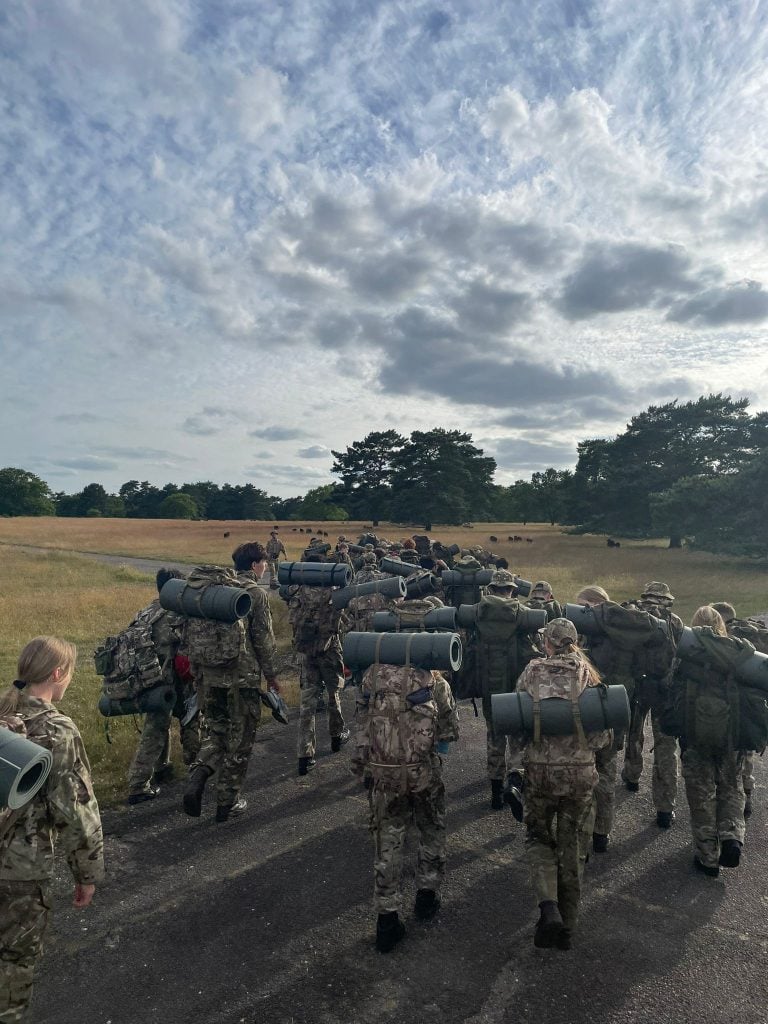
CCF Army Field Day and Overnight
Joining our RAF cadets at Barnham training area, the Army section deployed and set up the bashas to sleep under as soon as they arrived. Cooking their evening meal from their ration packs, Year 9 then took part in a night noises exercise, while the Year 10 conducted an ambush. Friday saw Year 9 cadets go through a rota of stands; pairs fire and movement, navigation, a stalk, and patrol observation skills. Meanwhile Year 10 cadets carried out section attacks. Another great experience for our cadets, everyone thoroughly enjoyed the experience.
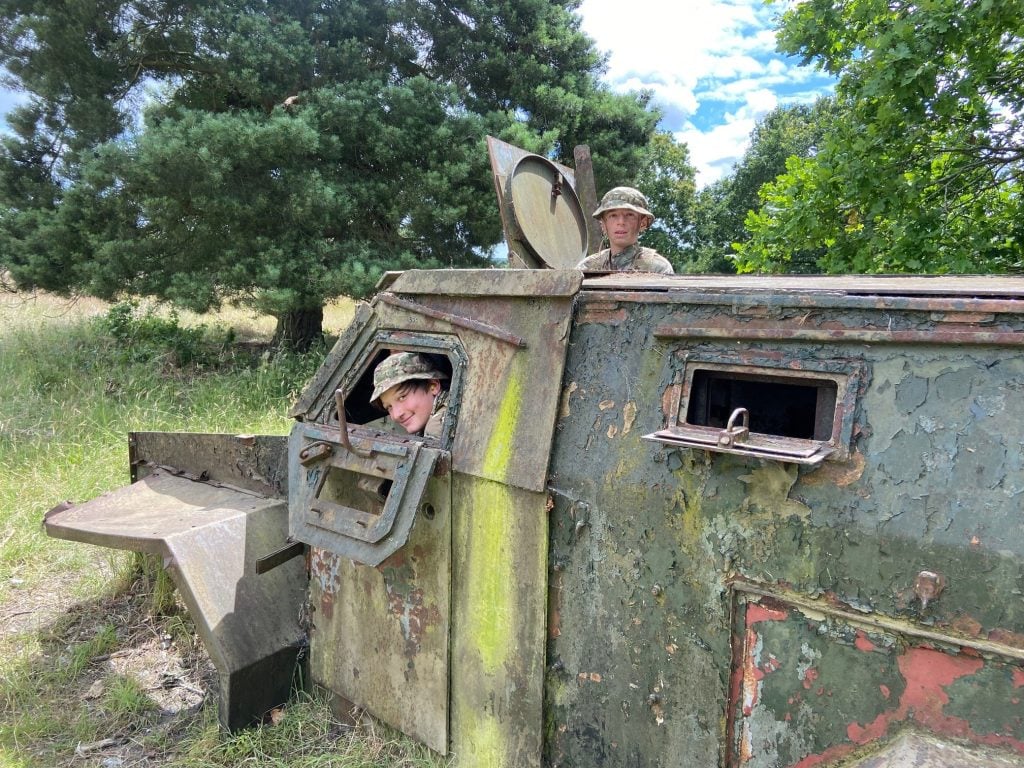
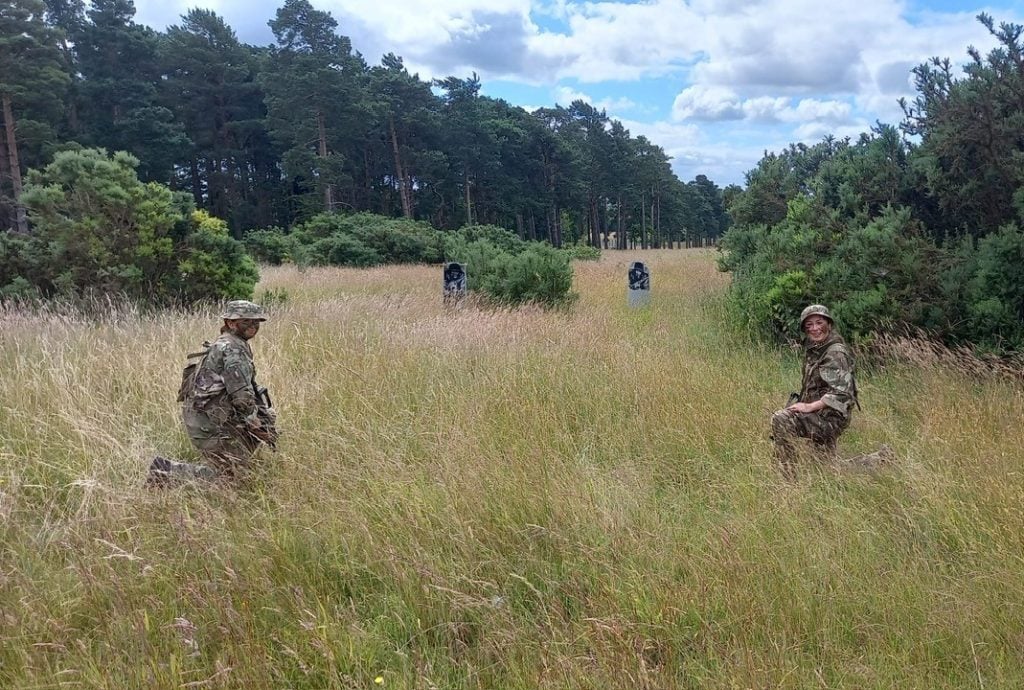
CCF Navy Field Day and Overnight
Last week the Royal Navy section enjoyed an afternoon of raft building in Holbrook Bay. The breezy conditions thoroughly tested the knot-tying skills of our cadets, and gave all a good workout paddling ahead of overnight camping nearby, overlooking the beautiful Stour. After a calm and clear night under canvas, a selection of cadets took part in sailing and windsurfing at Alton Water, while others had the opportunity to have a go at archery and canoeing at the campsite and on the river Deben. Fair to say everyone enjoyed the activities, another great Field Day for our Navy cadets.
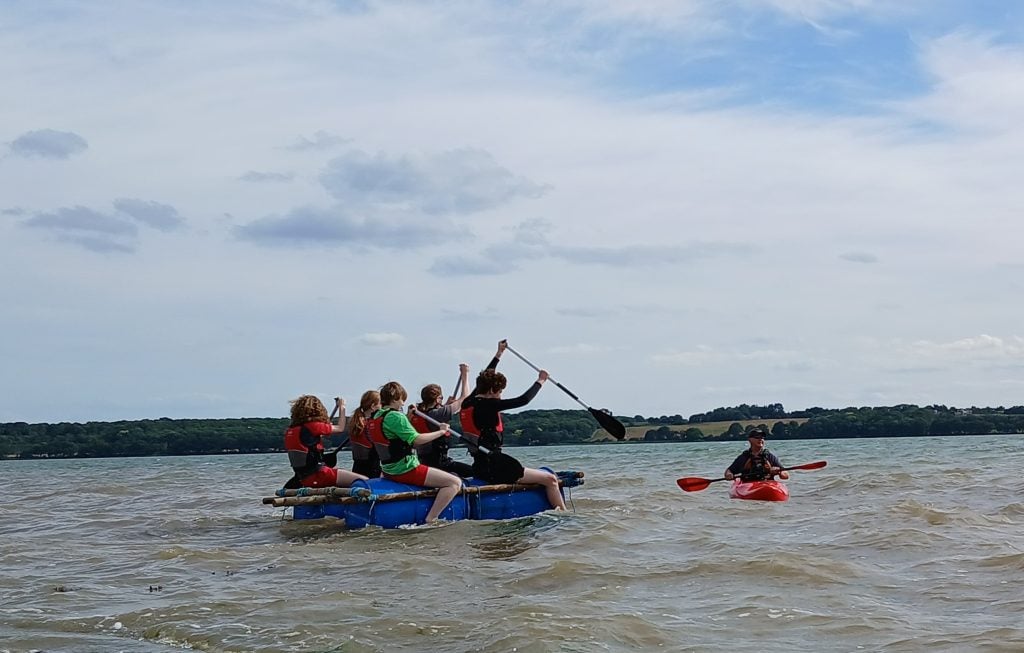
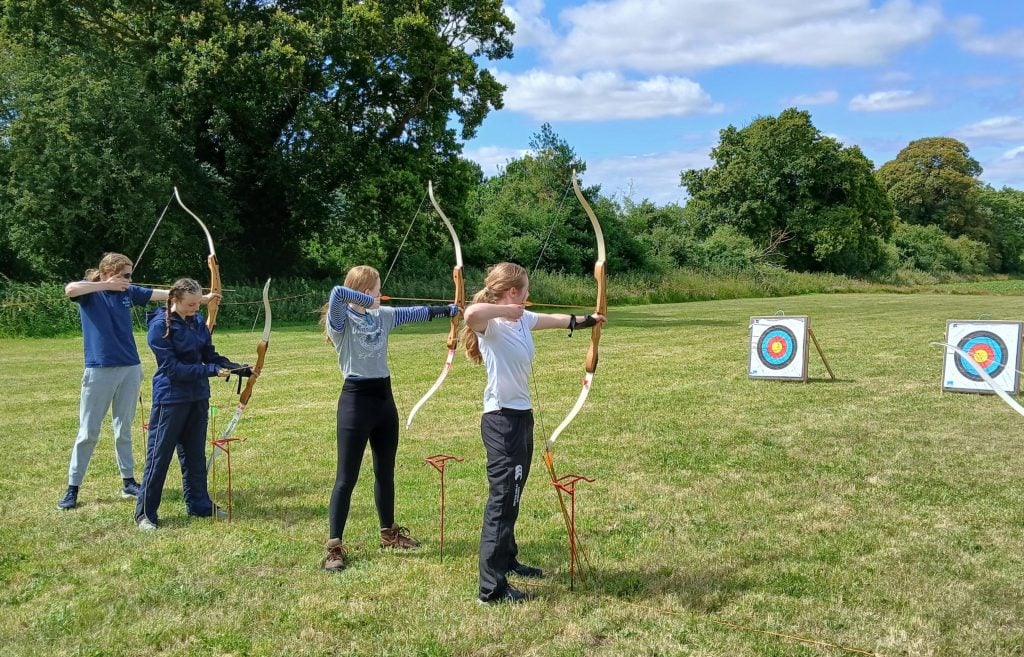
Miss Norman recently announced, confirmed and congratulated our new Heads of School for the academic year of 2024/2025.
Congratulations to Year 12’s James and Georgie, familiar faces in School and in our School news, Miss Norman commented,
I’m delighted to confirm James and Georgie are our new Heads of School, their appointment is testament to how well thought of, respected and trusted they are by their peers – as well as the teachers in School. Well done to both of them, I look forward to seeing the impact they have in the new academic year.
We recently met up with them both, talking about their new appointment and how they feel about the year ahead.
James, Head Boy

I feel hugely honoured to take on this role. Having been at the School from reception, I’ve been able to continually see just how warm and brilliant this community is, and so to be a representative of it is something I am massively excited about. I’m admittedly slightly nervous too – Olly has done such a marvellous job in the last year so that’s a lot to follow – but I’m eager to throw myself into this role.
In terms of any changes I might propose, the great news is that the School is already brilliant, and I’m not sure that any drastic changes are required! I think it would be marvellous if we were able to raise more awareness to our students of all the co-curricular opportunities that Woodbridge School provides – in so few schools would you have Doctor Who Club in one room, Chamber Choir in another, and the Hockey First Team on our new astro. The array of opportunities here is genuinely staggering, and I’m eager to draw attention to this, urging students to try different hobbies or interests – because it might end up being something you choose to focus on beyond School!
I think accessibility to all years is a really significant part of the role – being open and available not just to the Sixth Form. I’m hoping that all students, especially those in lower school, will feel as if they can come to me with any concerns, problems, or ideas and I’ll be an approachable figure within the school community. Community is such a massive part of this School, and instilling the idea that we should be open to everybody’s opinions and comments is really important.
I’ve had a truly wonderful time at Woodbridge, and I’m most excited by the thought of helping others have just as wonderful a School experience. I’m looking forward to having some ability to respond with action to student’s queries or desires within the School, and ultimately making sure everybody feels welcome and happy here.
As organisation is obviously a huge part of the role, I’m looking forward to the impact this will have on my own personal growth and development – and see this as a very welcome challenge. Already my calendar is becoming full and I have an ever-growing to do list in terms of my new role and responsibilities; I’m embracing both! But I’m also delighted to be paired with Georgie in her role as Head Girl, since I know she’s such an organised person, she’ll definitely be supportive in my continued development of this much-needed skill – in School and life.
Georgie, Head Girl

Being Head Girl for the upcoming academic year is a great honour and a wonderful opportunity, which I feel incredibly privileged to have been afforded. This School, the co-curricular opportunities and activities it offers, and the many teachers who have gone above and beyond to help me and all other students, have been vital in supporting both my academic and personal life. For that I am in such great debt to the School and I hope that through my appointment as Head Girl I can give a little something back.
In many ways, taking on this role is somewhat bittersweet as it means saying goodbye to Olly and Isla, they have been such brilliant role models who have been eager and comprehensive in supporting James and I as we step into our new roles. Needless to say, they have certainly left extremely large shoes to fill.
Personally, I am extremely enthusiastic about sport, therefore I would love to use this opportunity to champion sport at Woodbridge, particularly girl’s sport. For me, this means emphasising that sport is for everyone, whether that is competitively or just for fun and fitness. It is very important to me that students leave Woodbridge with a positive outlook on sport, whether that is to play in a university first team, frequent the local gym or just a weekly jog with a friend; all or any of these are important and I hope that I can work with the sports department to help students find fun in an activity of their choice.
Alongside this I would love to reinvigorate the Equality, Diversity and Inclusion society. In the past it has provided myself and many others with a safe, collaborative space to discuss pressing issues, listen to alternative perspectives and learn new things which is something that I look forward to recreating.
As Head Girl, there are many opportunities for me to advocate for the School at a variety of functions and events, which I very much look forward to. I also think that a big part of my role is to represent the student body and I wish to be approachable at all times so that students feel they can talk to me.
I look forward to this coming year with a great deal of excitement and anticipation, as thankfully this role provides me with more opportunities to interact with younger years. I hope that through this I will get to know more students and that they will feel comfortable approaching me with any issues or challenges that they face – or that they just come to see me for a chat. Through this interaction and communication I hope to represent the whole student body, to raise any issues no matter how small, so that every student feels they are listened to.
Being Head Girl is a significant time commitment, and as an already busy person I would say that time management is most likely to be my greatest challenge.
Having said that, the time that I spend doing things for Head Girl I will enjoy immensely as I love advocating for the School which I feel so passionately about. It’s fair to say that that when I really want to do something, I can always find the time. Oh and of course, the greatest challenge of all – continually fixing James’ ties!
I’m very much looking forward to working with James. Those who know us, would attest that we have a sibling-like relationship. He is such a charismatic, fun friend who I don’t spend enough time with, due to our differing A levels and busy schedules, so this is a brilliant opportunity to change that too.
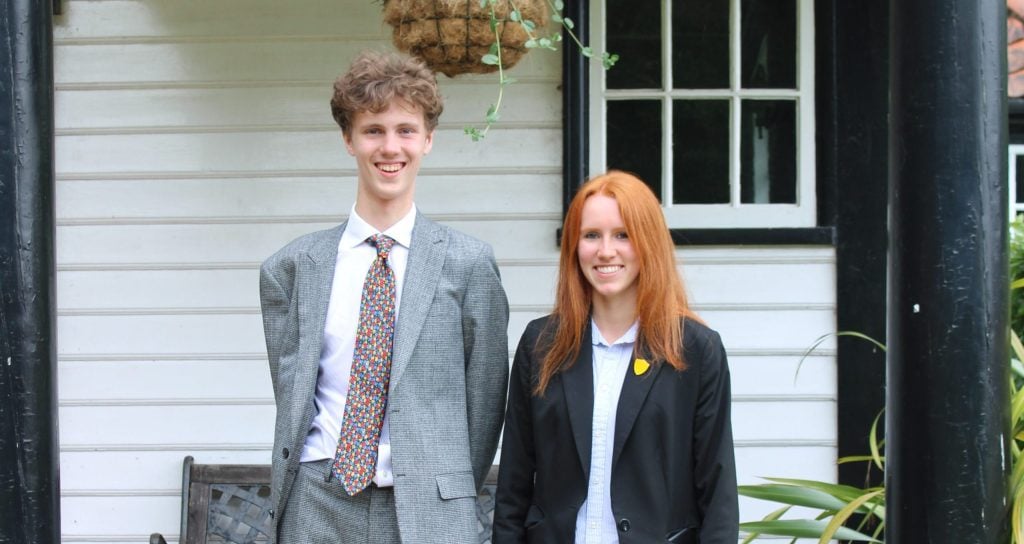
Last week our National Schools Chess team competed in the finals of the competition at Nottingham University. Back in September, 341 teams entered the competition, whittled down to 26 going through to the finals, of which we were seeded 20th and East Anglian champions.
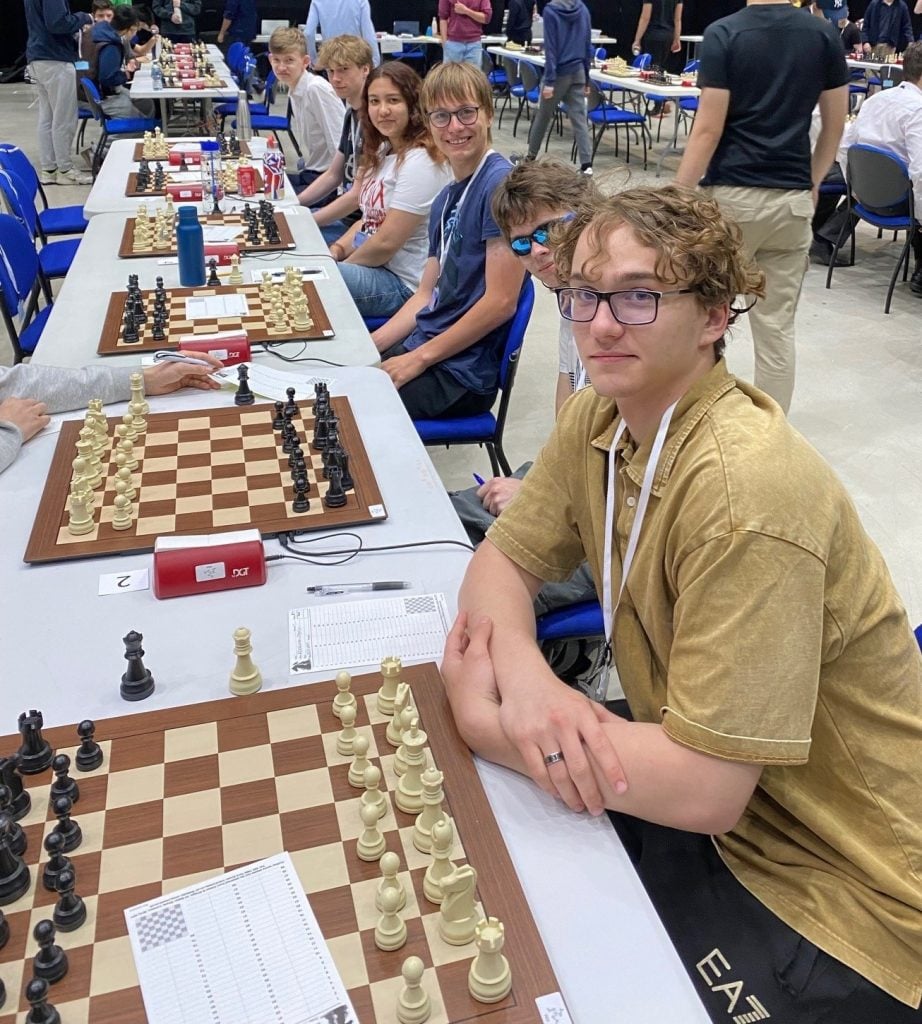
Our first round saw a narrow loss to RGS Guildford 3.5-2.5, but we bounced back with wins over University College School and Nottingham High School 5-1.
Round four saw a defeat to City of London School for Boys, before a final round draw with Latymer School.
We finished 11th overall, outscoring our seeding significantly; we received a chess clock as a prize.
Well done to Year 13’s Polina and James, Year 12’s Sergei and Harry, Year 11’s Nikolai, and Year 10’s Rowan; final scores in board order were Sergei 4.5/5, Nikolai 2.5/5, Rowan 2/5, Polina 2.5/5, Harry 2/5 and James 2/5.
Congratulations to these six and everyone else who has played for the School this year, both in the Nationals as well as online in the Ivan Gromov League which we won.
The sun shone, the School grounds looked wonderful, and so the stage was set for the students to perform to their very best to get as many points as they could for their houses.
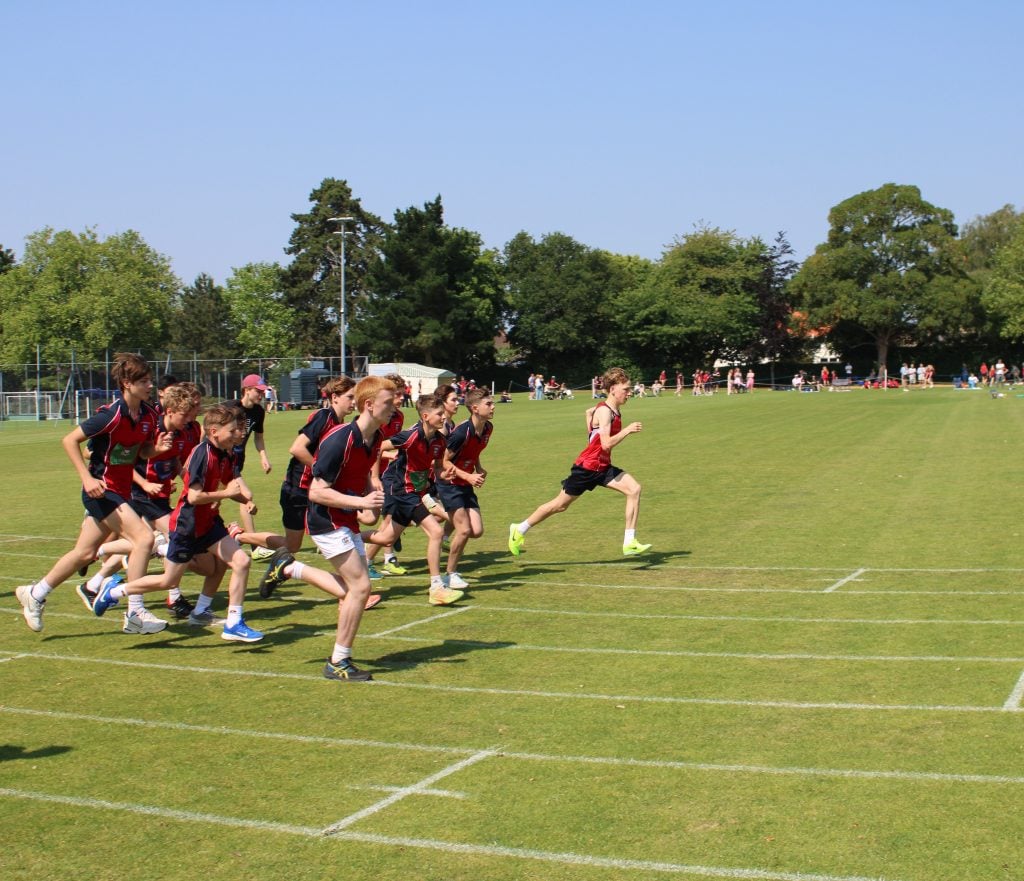
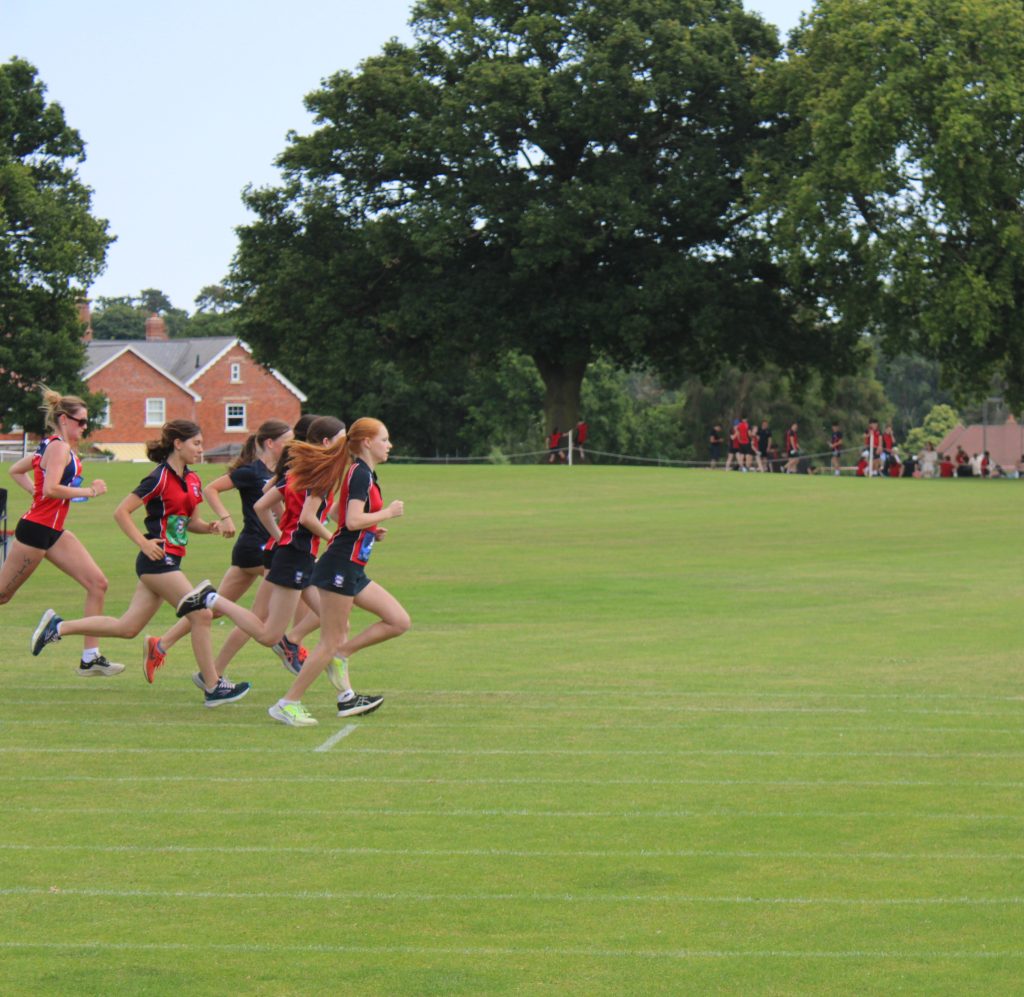
It was lovely to see the students working together, supporting each other and cheering their teams on – and clearly that support worked, as we had 10 records broken!
- Year 7’s Alexandra – 800m
- Year 7’s Tom – 300m
- Year 7’s Dexter – 800m
- Year 7’s Josh – 200m and 1500m
- Year 8’s Digby – 300m, 800m and 1500m (The 800 record has stood since 1977!!)
- Year 9’s Georgia – Triple Jump
- Year 10’s Eloise – Triple Jump
Victor Ludorum and Victrix Ludorum results were as follows:
- Year 7 Boys: Josh
- Year 7 Girls: Alexandra
- Year 8 Girls: Alice
- Year 8 Boys: Oscar
- Year 9 Boys: Oliver
- Year 9 Girls: Georgia
- Year 10 Girls: Eloise
- Year 10 Boys: Arthur and Sam
- Senior Boys: Toby
- Senior Girls: Millie
Well done to all of the competitors for giving their all, and many thanks to all of the staff involved on the day and in the lead up to Sports Day, as well as to the parents, family and friends supporting.
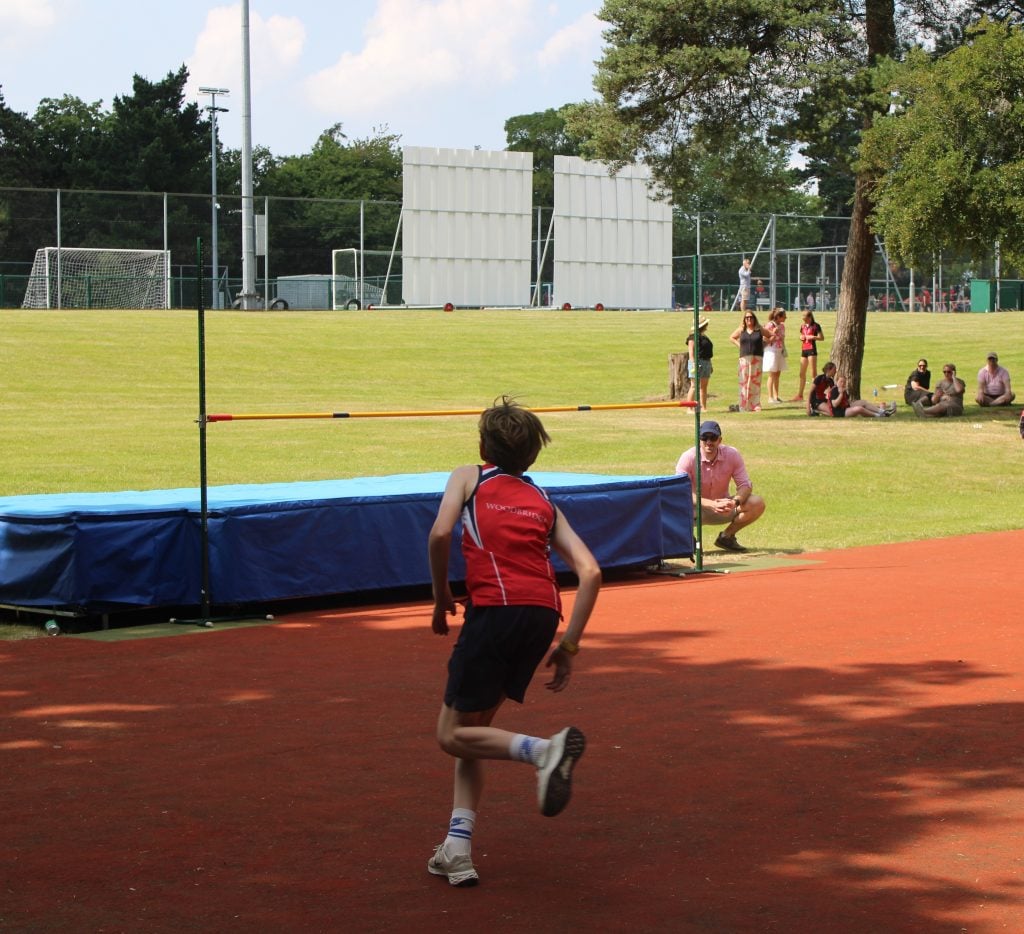
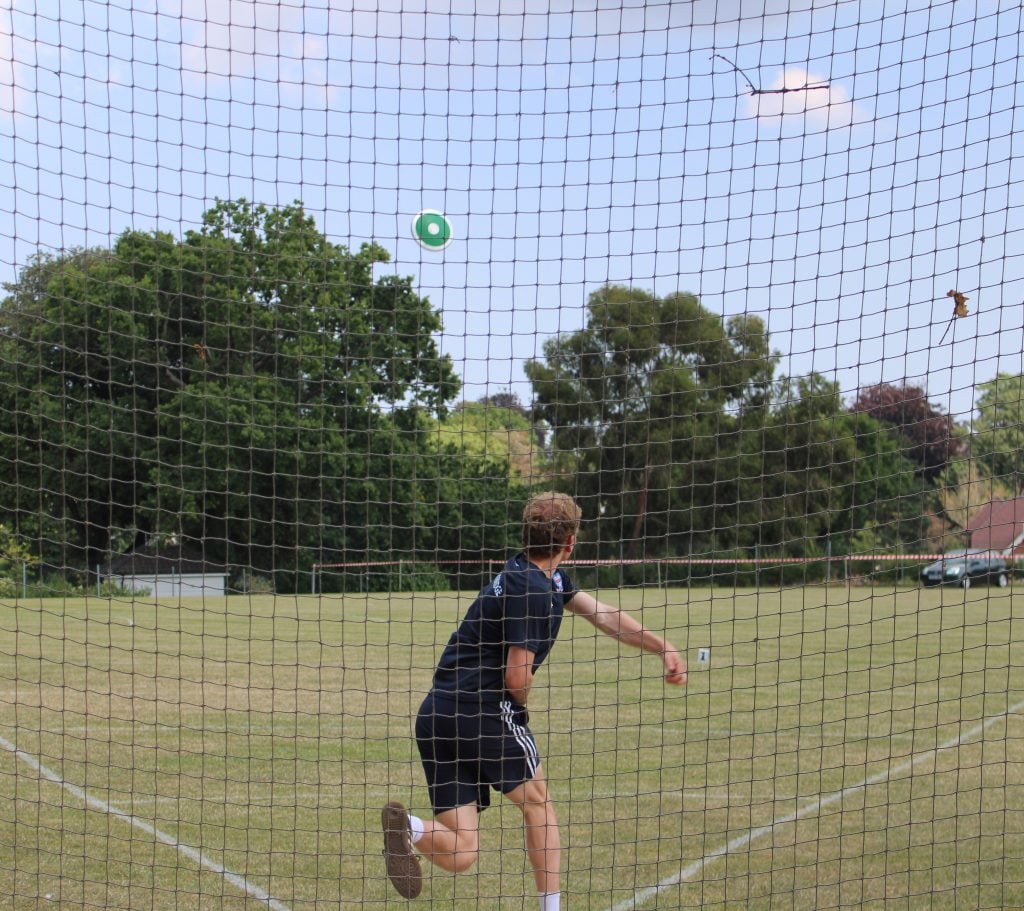
We wish Year 6’s Chloe, Year 7’s Dex, Josh, Olly, Tom, India J, and Alexandra, Year 8’s Oscar and Digby the very best of luck for Wednesday 3 July when they all compete for the East Region in the National Prep School Athletics Championships in Birmingham. Good luck also to Year 9’s Romilly and year 13’s Henry who are both competing for Suffolk on 12 and 13 July in the English Schools Track and Field Championships.
Also a shout out to the Year 7 boys’ and Year 7 girls’ athletics teams who smashed it at Northgate last week, each winning. This was the first time competing in athletics against other schools for many of them, so very well done.
A link to Sports Day photography and the access code will be shared with parents privately.
